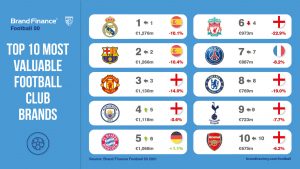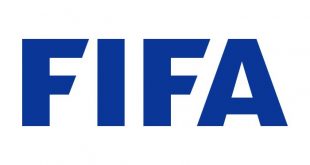 The failed European Super League (ESL) project has dented the brand strength of the 12 founding clubs and knocked over €600 million off their total brand value, according to the latest Brand Finance Football 50 report, which ranks the top 50 most valuable and strongest football club brands in the world every year.
The failed European Super League (ESL) project has dented the brand strength of the 12 founding clubs and knocked over €600 million off their total brand value, according to the latest Brand Finance Football 50 report, which ranks the top 50 most valuable and strongest football club brands in the world every year.
The ESL announcement visibly damaged the brand strength of the 12 clubs involved, causing an average decrease in their Brand Strength Index (BSI) score of -3.0 points.
The Brand Strength Index (BSI) is a balanced scorecard of brand metrics used by Brand Finance to benchmark the power of brands to drive success for the business. For football clubs, this scorecard includes market research among fans, rating clubs across a range of attributes, including strong heritage, the club is well run, and the owners care for the fans.
As well as damaging the strength of the 12 founding clubs’ brands, the ESL proposal has also knocked €606 million off the total brand value of the clubs, equating to a 6% year on year decrease. Weaker brands see reduced forecasts for their commercial and sponsorship success.
Before the plans collapsed, Brand Finance calculated that the ESL could have stripped €2.5 billion – or 25% of the total – in brand value from the 12 clubs. Although much of this damage has been averted, the impact on the perceptions of all stakeholders is still significant.
The results can already be seen, with Liverpool losing the sponsorship of Tribus Watches and Manchester United being said to have missed out on a £200 million deal from locally based The Hut Group.
Hugo Hensley, Head of Sports Services, Brand Finance, commented, “The origin and demise of the European Super League is a story of branding – the 12 clubs considered their brands too strong and attractive to be sanctioned by other associations, and above the footballing pyramid that validates their success. However, the communication, promotion, and positioning of the project were poorly executed, fuelling a backlash from all stakeholders, leading to the dissolution of the group, and resulting in painful brand damage.”
Bayern takes the lead in brand strength and enterprise value
Unaffected by the ESL fiasco, and thus avoiding the disastrous damage, Bayern Munich has claimed the title of the world’s strongest football club brand this year, with a brand strength score of 91.9 out of 100 and the corresponding elite AAA+ rating.
Bayern’s performance has been unrivalled over the past year, winning the sextuplet of the Bundesliga, DFB Cup, UEFA Champions League, UEFA Super Cup, FIFA Club World Cup, and DFL Super Cup ultimately leading them to be named the Laureus World Team of the Year for 2021. They are the first team ever to lift the Champions League with a 100% record, which included an 8-2 win over Barcelona.
Bayern’s leading brand strength score has contributed to an increase in brand value to €1,068 million and climbing up to 5th position overall in the ranking. The club’s enterprise value has also rocketed up by nearly €300 million to €3,606 million, allowing them to take the crown in that ranking too, recording an 8% increase year-on-year. Sometimes it pays off to be the nice guy with Bayern leading the figures for commercial revenue generation of any football team at €360.5 million, a key contributing factor to the year-on-year increase in enterprise value. Real Madrid, Liverpool, Manchester United and Manchester City round up the top five for enterprise value.
Hugo Hensley, Head of Sports Services, Brand Finance, commented, “The German 50+1% supporter shareholding model means that the fan is respected as the ultimate stakeholder. This has kept Bayern Munich out of the European Super League fiasco, while on-pitch performance has further boosted the brand’s strength. This is a positive signal for future sponsorship performance, and Bayern is already the football club with highest commercial revenue in the world – these factors all come together to boost brand and business value.”
b>LaLiga giants Real Madrid and FC Barcelona retain gold and silver
Real Madrid remains the most valuable football club brand in the world for the third consecutive year, despite recording a 10% brand value decline to €1,276 million. The club still maintains a slight lead ahead of fierce rivals Barcelona in second spot, with a brand value of €1,266 million, also declining by 10% this year.
While the LaLiga giants remain on the podium for 2021, it has now been three years since a Spanish club has reached the final of the UEFA Champions League, with the last appearance being Real Madrid’s victory over Liverpool in 2018. Despite this, both Spanish clubs have consistently been able to secure Champions League qualification year after year, with the last time either club failed to reach the groups stages now more than 20 years ago. This consistent influx of Champions League revenues and status has played a central role in both clubs’ overall success.
Top 10 most valuable club brands
Close behind Real Madrid and Barcelona, Manchester United has retained third place despite suffering a 14% decline in brand value to €1,130 million. The club will be looking to capitalise on a stronger season under Solskjær – securing second place in the Premier League and booking their place in the Europa League final against Villareal on 26th May – as well as re-establishing themselves as League contenders and a powerhouse within Europe.
Neighbours and bitter rivals Manchester City are now just 1% (€12 million) behind Manchester United in brand value – the closest the two clubs have ever been in their history. Within the top 10, only Manchester City in 4th (down 1% to €1,118 million) and Bayern Munich (up 1% to €1,068 million) in 5th avoided significant brand value decreases, resulting in both clubs climbing one spot in the ranking.
Liverpool, which had seen a resurgence under Jürgen Klopp, winning both the 19/20 UEFA Champions League and claiming the English Premier League title last year, have struggled this year, finding themselves battling for a place in next year’s Europa League. This, coupled with the impacts of COVID-19, has caused the club to suffer a 23% decrease in brand value to €973 million, seeing them fall from 4th to 6th in the rankings. Resecuring their position in Europe’s premier knock-out competition will be critical in driving future growth.
PSG (down 8% to €887 million) in 7th, Chelsea (down 19% to €769 million) in 8th, Tottenham (down 8% to €723 million) in 9th, and Arsenal (down 6% to € 675 million) in 10th have all retained their positions in the top 10, with declines in brand value recorded across the board.
Clubs hoping to sack COVID-19 in the 21/22 season
Clubs have continued to lose out on key ticketing and other matchday revenue as COVID-19 has kept doors closed to the majority, with only small groups of fans able to attend a handful of fixtures over the campaign. The pandemic also brought many sponsorship deals under the microscope as football was put on hold for a portion of 2020, meaning uncertainty vested in whether sponsors would enjoy the brand exposure, activation, and return they had originally expected. The adverse impact has been felt across the top 50 club brands with total brand value declining by 11.2% versus a 2.2% drop last year.
League representation
The English Premier League remains the most represented league within the top 50 with 18 clubs featuring and accounting for 43% of total brand value.
The Bundesliga is the second most represented league, with 10 clubs featuring in the top 50, up from eight in 2020. While they have more clubs in the ranking than LaLiga, the Spanish League represents 20% of the total brand value compared to the Bundesliga’s 19%.
Italian clubs make up 8% of total brand value but are still without representation within the top 10, with Juventus (down 16% to €565 million) currently sitting in 11th position.
Just three French teams are represented within the top 50: Paris Saint-Germain (down 8% to €887 million)in 7th; Lyon (down 11% to €161 million) in 27th, and Marseille (down 19% to €105 million) in 46th. The Netherlands (Ajax), Russia (Zenit) and Portugal (Porto) each have one club featured in the top 50 this year.
Gazprom supplying the energy Zenit need
This year’s largest increases in brand value come from Zenit (up 35% to €135 million), Aston Villa (up 28% to €147 million), and new entrant Leeds (up 26% to €117 million).
Zenit St Petersburg is Russia’s sole representative in the top 50 and boasts the 15th highest reported revenue of any club. The club have now won the Russian Premier League for two consecutive seasons and benefitted from a lucrative commercial deal with Gazprom. A second successive year of guaranteed UEFA Champions League participation will supplement broadcasting revenues further as the club’s take from Europe far outweighs the domestic distribution.
 Arunava about Football A look at football & the world through my eyes!
Arunava about Football A look at football & the world through my eyes!



